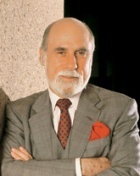Vint Cerf

In the late 1960s, Vint Cerf was doing revolutionary work. After an undergraduate degree in mathematics from Stanford, his doctoral studies led him to UCLA where he helped develop software to network computers for the U.S. Defense Department's Advanced Research Projects Agency (ARPA). That work would lead directly to the creation of the Internet.
Lured by calls from eminent Stanford professors - including Don Knuth, likewise an Engineering Hero - Cerf was enticed to return to Stanford where he joined the computer science and electrical engineering faculty in 1972. It was while at Stanford serving as an assistant professor that Cerf, his students, and Robert Kahn at ARPA created the Transmission Control Protocol (TCP) that would determine how packets of data get addressed, distributed and reassembled at their intended destination as they travel about the Internet. Today, TCP Internet Protocol (TCP/IP) is the foundation for all data traffic on the Internet and Cerf and Kahn have been christened "the fathers of the Internet."
In 1976, Cerf left Stanford to join ARPA. He has since become global champion of the Internet, helping guide its governance. His latest effort has been to challenge the world to "Re-think the Internet" by improving upon some of the technical shortcomings of his creation.
From 2000 to 2007, Cerf chaired the Internet Corporation for Assigned Names and Numbers (ICANN), which oversees the management of the Internet's unique names, identifiers, addresses, and parameters. In 2005, he became Vice President and Chief Internet Evangelist at Google, a title he still holds today. He has been honored with the U.S. National Medal of Technology, the Presidential Medal of Freedom - the highest civilian award - the Charles Stark Draper Award and the A.M. Turing Award, among many others.
Professor: 1972-1976
Last modified Mon, 3 Dec, 2012 at 20:04